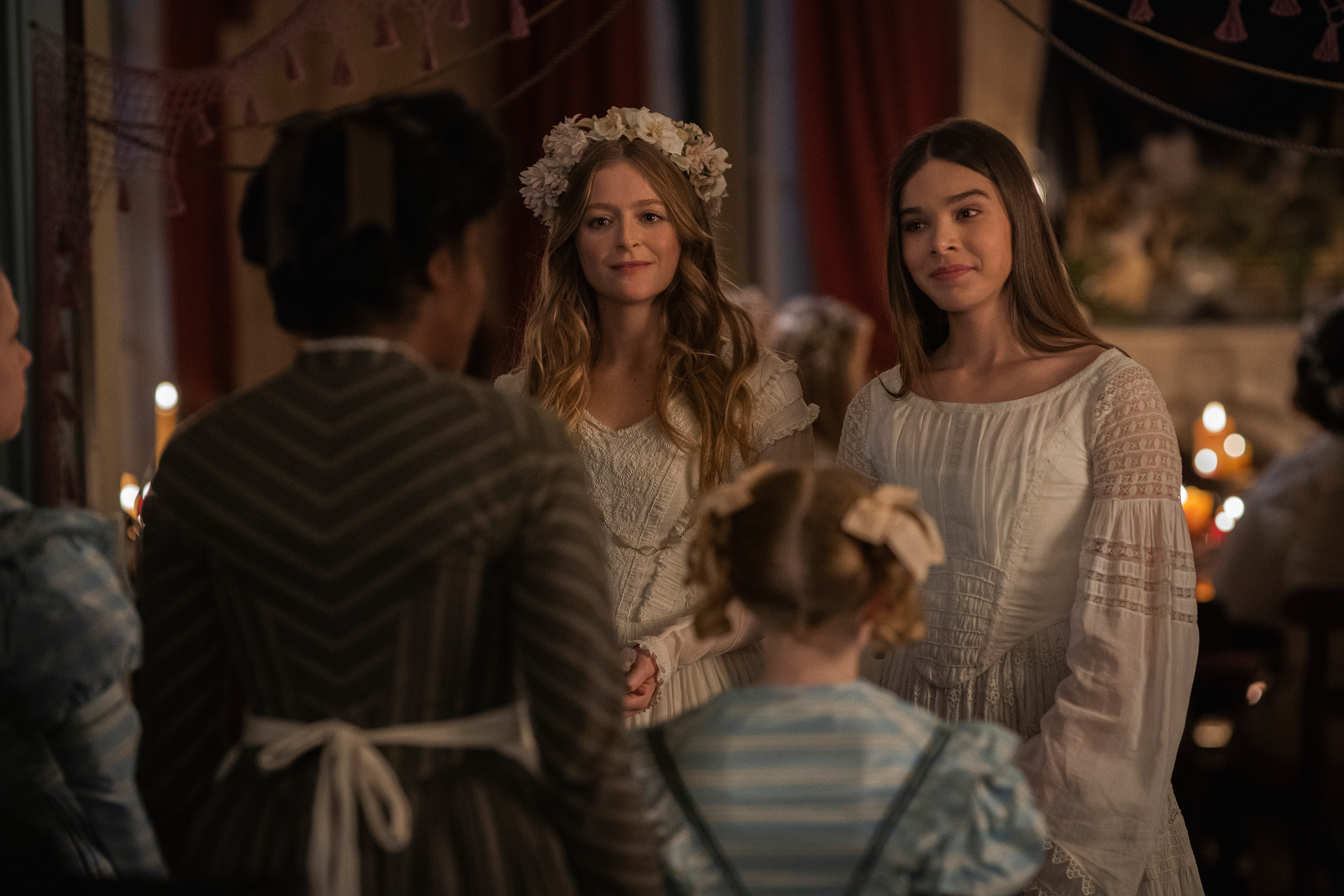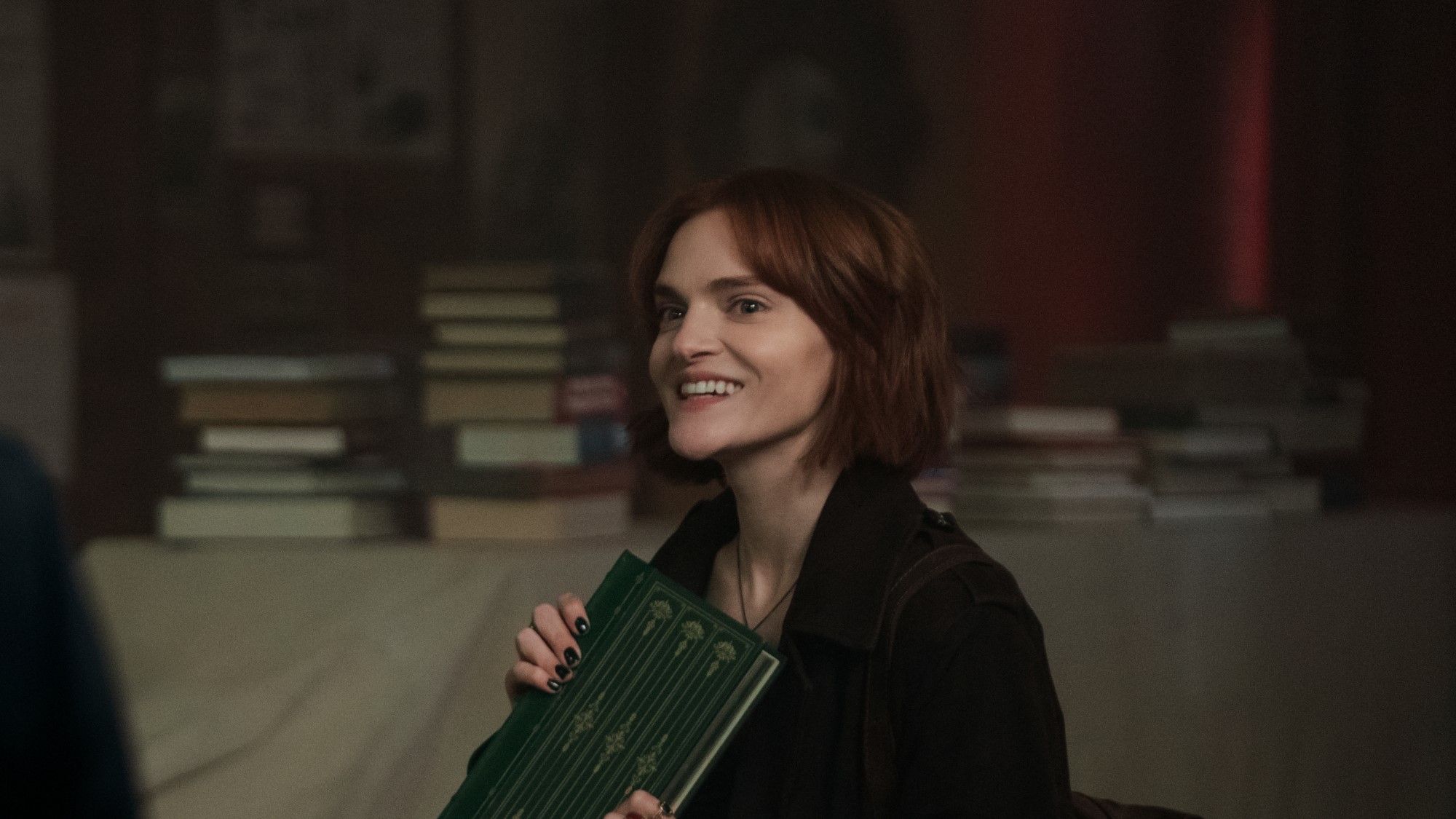What to Watch Verdict
Capturing the essence of Emily Dickinson's work while bending the historical drama rules is far from a gimmick as Season 2 proves.
Pros
- +
🌸Hailee Steinfeld's performance captures Emily's conflict and joy in equal measure.
- +
🌸Pop songs and modern language are a vital part of the tapestry.
- +
🌸The whole Dickinson clan shine.
- +
🌸Supporting character Henry is more in focus.
- +
🌸A new ghostly figure sets up an intriguing mystery.
Cons
- -
🌸Purists will still bristle at the contemporary music and dialogue.
- -
🌸It is hard to read new character Samuel Bowles (and it is unclear if this is the intent).
This post contains detailed spoilers for Dickinson.
Mirroring the opening of Dickinson’s first season, a projector slideshow narrated by Sue (Ell{"data-model-name":"Apple TV plus","data-widget-type":"simple"}a Hunt) emphasizes the limited source material behind this sophomore outing beyond Emily Dickinson’s now-famous words. Laying out familiar artifacts of Emily’s (Hailee Steinfeld) life, Sue explains the events we have already witnessed were based on records that are “full and factual compared with what lies ahead.” The late 1850s period was one of Emily’s most productive creatively and while few letters exist from this time, there is another source of insight into her state of mind. “The truth, perhaps, is hidden in her poems,” Sue suggests as the flickering images speed by. In lieu of knowable facts, this poetic interpretation informs Alena Smith’s often playful — and deeply insightful — version of a woman who has been hailed America’s greatest poet. Earning the title of the first Apple TV+ series to launch its second season, it comes out of the gates strong and makes a case for subscribing to this streaming platform.
Eschewing a rigid framework that insists on period-accurate dialogue, soundtrack choices and references is far from a gimmick to incite disdain from purists. This opening statement heralding Emily’s poetry rather than subjective documents suggests that while contemporary terms litter the script, the essence of the series is Emily Dickinson. No, she didn’t dance to pop beats but the spirit and freedom of these moments with her siblings infuse an irreverent spirit that can be found in Emily’s poetry from this period. A darkly comedic thread weaves its way through the first three episodes while introducing the theme of fame alongside the overarching death symbolism. So far Death (Wiz Khalifa) has not appeared for a midnight ride, but Emily has made a new mysterious friend who no one else can see. Reciting the lines from one of her most recognizable literary entries, Nobody (played by Will Pullen, this ghostly figure has no name) tells Emily “I’m Nobody! Who are you?” when she first asks his name on the train back to Amherst.
Traveling with her father, the pair have been to see a doctor about Emily’s worrying blurry sight. This sequence coupled with the opening montage — set to “Wild Wild Woman” by Your Smith — establishes the shift in time and emphasizes the importance of the daily newspaper, the Springfield Republican. Emily’s creativity is in full flow and the stack of poems she sends to the new house next door is ignored by Sue in favor of the newspaper. This is the first sign that unresolved tension bubbles beneath the surface, which goes beyond what we saw in the first season. On the train home from the doctor, it is apparent that Mr. Edward Dickinson (Toby Huss) supports Emily’s chosen career as he inferred he would in the finale. This conversation highlights the precarious financial situation Edward has found himself was caused by an economic crash (known as the Panic of 1857) and the subsequent collapse of the railroad he had invested in. Austin’s (Adrian Blake Enscoe) new house and his wife’s expensive taste have also contributed to this setback.
Speaking of Sue, she no longer shops at Betty’s and instead splashes Austin’s cash on the finest New York City (by way of Vienna) has to offer — in reality, this is costume designer Jennifer Moeller’s stunning work. Hosting the hottest salon in town requires the gown to match and the stunning gold number causes quite the stir among the Amherst socialites. Sue has gone from the sad orphan to influencer, and this is all too much for Jane (Gus Birney) who has rebranded herself as the black veil-wearing widow. This bitchy friendship group’s commentary and flip-flopping opinions continue to serve some of the funniest lines — when discussing potential bookclub options it is noted that “Emerson is canceled.” They might be insincere on the main, but there is a genuine spark between Jane and Austin that goes beyond mere flirtation. His eye might start to wonder if Sue continues to give him the cold shoulder — except when he caters to her every materialistic whim.
The finest dresses are more than a status symbol and while it is hard to reconcile this emotionally distant Sue, the arrival of an ink-stained Emily at the hot ticket soiree prompts a confession of sorts. Despite the earlier scene, Sue has been reading Emily’s missives, however, she is having a hard time being an audience of one due to the feelings they generate. In part, this is romantic tension, but Sue is also dealing with a miscarriage she suffered after the wedding — Austin knows nothing. Losing a baby is still treated with whispers in the 21st century, which only hints at the wall of silence women experienced 150 years ago. Filling this hole with material goods is one coping mechanism, the other is to turn Emily into a famous poet. The interactions between the pair are few in these opening episodes, which will disappoint Emily and Sue shippers but the chemistry in the fire lit sequence crackles with intensity.
Enter Springfield Republican editor-in-chief Samuel Bowles (Finn Jones) as the man who Sue has called on to help with her “make Emily famous” project. Calling her Susie suggests the two are familiar and there is a smug sensibility about the newspaperman, which at this early stage may or may not be an intentional choice to suggest he’s untrustworthy. When Samuel is on screen it is hard to not yell at Emily to run and listen to the ghostly figure. Standing at the crossroads, Emily’s options are limited but she does have the support of her family and the main obstacle she faces is herself. Seeing this ghost soldier get shot in her kitchen after the Episode 3 séance has tipped from fun into creepy is the push she needs to defy the call to remain anonymous. “The only Ghost I ever saw” is perhaps the strongest of the first three episodes, which manages to inject horror and humor within one sequence.
The printing press is vital in speeding up change and she is not the only one contemplating the power of the written word. The North abolished slavery by 1804, but this doesn’t make it impervious to racist behavior. Season 1 highlighted the latter after Henry (Chinaza Uche) feared for his safety (even though he is a free man) and Amherst academics debate abolition like it is something that is none of their business. Henry is joined by dressmaker Betty (Amanda Warren), maid and medium Hattie (Ayo Edebiri), and other Black Amherst residents using Austin’s barn as a meeting place to discuss their newspaper, The Constellation, and how to start a revolution. The oldest Dickinson sibling is searching for a way to feel important and has given substantial funds to Henry — it is also unclear as to how much Austin knows about the content of the barn meet-up. Looking backward and forwards, one of Dickinson’s strengths is in its ability to draw parallels between the 1850s and the present-day without being coy or irreverent in these observations.
While some characters bristle against societal and technological shifts, there is a sense of wonder shared by the Dickinson siblings despite their outward differences. Lavinia (Anna Baryshnikov) continues to grow, exploring her sexuality and feminism. She contemplates the patriarchal fallacy of marriage and refuses to bend to traditional values desired by her new love interest, border Henry “Ship” Shipley (Pico Alexander). Like mother, like daughter, and Mrs. Dickinson (Jane Krakowski) also experiences urges that don’t match up with the housewife manuals of this period. This could spell issues for this marriage, and while Krakowski is very good in Season 1, she didn’t get much meat to chew on. This will give her more emotional beats to hit and Dickinson thrives when balancing comedy and sorrow. Hailee Steinfeld’s ability to walk this line so effectively is on display in these opening episodes and it is clear both the actress and Emily are far from a nobody.
Dickinson will premiere on Apple TV+ on Friday, January 8.
Emma Fraser spends most of her time writing about TV, fashion, and costume design; Dana Scully is the reason she loves a pantsuit. Words can also be found at Vulture, Elle, Primetimer, Collider, Little White Lies, Observer, and Girls on Tops. Emma has a Master’s in Film and Television, started a (defunct) blog that mainly focused on Mad Men in 2010, and has been getting paid to write about TV since 2015. It goes back way further as she got her big start making observations in her diary about My So-Called Life’s Angela Chase (and her style) at 14.












